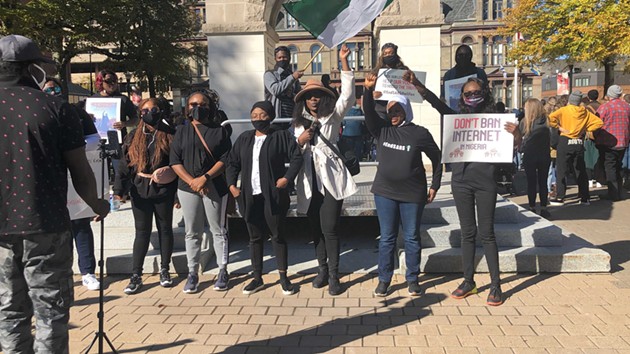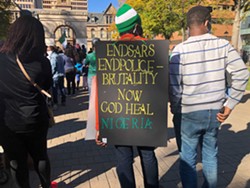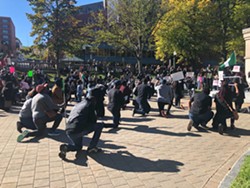In April 2008, Halifax resident Kunle Fakiyesi left his home in Lagos, Nigeria. He was on his way to pick up his clothes from a tailor when he was stopped by some armed men in a van. They were not in uniforms and he questioned their asking him to get into the vehicle. They pointed their guns at him, corked it and asked him to get into the van which he did. They coerced some other men on the road into entering their van as they made their way to a police station. When they got there, they robbed them. Fakiyesi says they took his wallet and his phone and “they threw me out. I had to beg a bike man to take me home.”
He was lucky, he says. Many other Nigerians experience this and don’t make it alive. On Sunday, he shared his story with more than a hundred people gathered at the Grand Parade in Halifax for a ENDSARS rally. He and the others rallying hope the Canadian government will do something about the injustice happening in Nigeria. “People are getting killed in Nigeria like chickens and the west is not saying anything about it,” he told The Coast.
Special anti-robbery squad (SARS) is a unit of the police in Nigeria that was created in 1992 to curb the armed robbery attacks but the system that was created to protect the people has gone rogue extorting people, raping them, labelling them as criminals unjustly and in many cases, killing them. And in Nigeria, youths have been protesting for over a week for this group to be totally scrapped and for police reform.
The president of the country, Muhammadu Buhari announced that SARS has been disbanded but Nigerians are not buying it. This is not the first time they have been told that the rogue unit would be scrapped yet the profiling and killings of young people have not stopped. During the protests, people were also killed and arrested and Nigerians in the diaspora have lent their voices to this cause.
Another protester Femi Adeyemi, told The Coast his story. In 2008, Adeyemi was stabbed five times by armed robbers but the police asked for money from his mother before they started investigations. He says he was out to protest to show solidarity with Nigerians back home and because “our government seems to respond only to international embarrassment.”
During the protest, Adeyemi gave a tribute by calling the names of those whose lives had been taken as a result of police brutality an ordeal he’s well aware of. “I’ve been stopped for having locked hair, for having a laptop,” he says. Having dreadlocks and owning a laptop are stereotypes that have been created to profile internet scammers—which is absurd because many people own laptops.
Police brutality is a worldwide issue. Just months ago, all over the world citizens were protesting against police brutality in Halifax and worldwide. In North America, the demand is to reform and defund the police and although the main call for the protest in Nigeria is better policing, some think the salaries and the way the officers are trained should be looked into. They say it may be the reason these officers behave the way they behave.
Nigerians all over the world are calling for the police brutality to end but they say it’s the first step in ending other injustices and corruption happening in the country. “We say end SARS, we say end police brutality, we say end all forms of bad governance,” says Oluwafunmilayo Akaka, one of the protesters in Halifax. She says they have a line up of protests to carry out until their needs are met and hopes the United Nations sees their protests and calls the Nigerian government to order.



